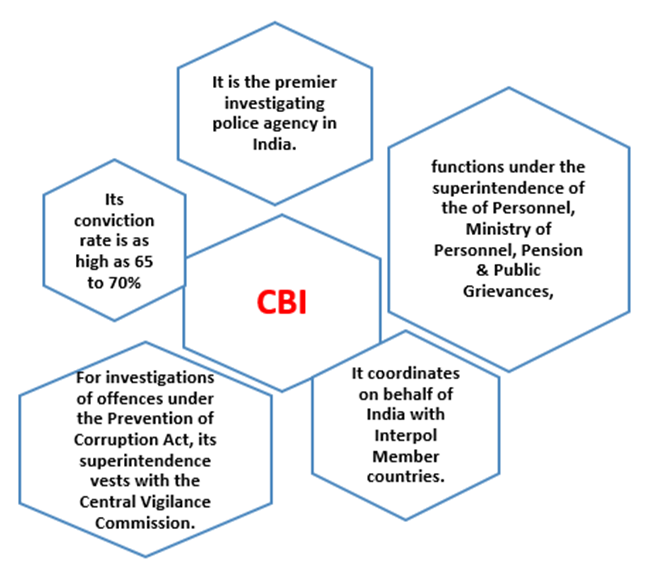Context:
The Supreme Court on July 10 upheld the maintainability of the West Bengal government’s suit accusing the Union government of “constitutional overreach” by employing the Central Bureau of Investigation (CBI) to register and investigate cases in the State despite its withdrawal of general consent on November 16, 2018. The Bench rejected the Centre's objections, ruling that the CBI is not an independent agency but functions under the Delhi Special Police Establishment (DSPE) Act, 1946, with its establishment, powers, and supervision vested in the Government of India.
What is General Consent?
Requirement of State Consent for CBI Investigations and Exceptions
Under Section 6 of the DSPE Act, the CBI is required to obtain consent from the concerned State government before initiating an investigation within its jurisdiction. This permission is crucial since "police" and "public order" are subjects that fall within the State List under the seventh schedule of the Constitution. However, no such prior consent is necessary in Union territories or railway areas. General consent is given by States to facilitate the agency’s seamless investigation into corruption charges against Central government employees in their territories.
Revocation of General Consent by States
Since 2015, several States such as Chhattisgarh, Jharkhand, Kerala, Mizoram, Punjab, Rajasthan, Telangana, Meghalaya, and West Bengal have revoked their general consent, alleging that the Centre is misusing the federal agency to unfairly target the Opposition. In the absence of such an omnibus consent, the CBI will be unable to register any fresh cases in these States without the explicit permission of the respective State governments.
The West Bengal Government’s Case
Allegations of Constitutional Overreach
In August 2021, the West Bengal government filed an original suit under Article 131 of the Constitution, arguing that the actions of the Union government and the involvement of the CBI in the State infringed upon its sovereignty. The suit highlighted that despite the withdrawal of general consent for CBI investigations by the Trinamool Congress government on November 16, 2018, the agency proceeded to register 12 new cases. Deeming this to be a "constitutional overreach," the State sought the annulment of these 12 cases and a restraint on the agency from lodging any further cases.
Constitutional Provisions
The framers of the Constitution envisioned such conflicts between the Centre and the States owing to the existing quasi-federal structure and dual polity. As a result, they conferred original and exclusive jurisdiction upon the Supreme Court to address such disputes, under Article 131. For a suit to be maintainable under this provision, two conditions have to be satisfied: it should relate to a dispute between the Government of India and one or more State Governments (or) between one or more State Governments, and it must involve a question of law or fact crucial to the determination of legal rights.
Judicial Verdict
In a 1977 case, the Supreme Court observed that Article 131 is a feature of federalism and should be "widely and generously interpreted" to advance the intended remedy. Similarly, in another 1977 case, the top Court cautioned against taking a very "restrictive or a hyper-technical view of the State’s rights."
|
Central Bureau of Investigation (CBI) Establishment and Powers
|
The Union Government’s Argument
Preliminary Objections
The Solicitor-General argued that West Bengal’s suit should be dismissed as it was not maintainable under Article 131 of the Constitution, which involves disputes exclusively between the Union and States. He contended that the CBI, which registered the cases, was not a party to the suit and is not a ‘State’ under Article 131. He claimed the CBI was an "independent agency" not directly controlled by the Union government. However, he conceded that the CBI cannot initiate any investigation without the Union government's authorization under Section 5 of the DSPE Act.
Contrasting Viewpoints
On the contrary, a senior advocate highlighted that the case extended beyond the Centre’s control over the CBI to the fundamental question of whether the agency could disregard a specific notification issued by the West Bengal government in 2018, withdrawing its consent. The senior advocate asserted that once a State grants and then withdraws its consent, the CBI lacks jurisdiction to exercise its powers within that State.
The Verdict
Court Observations
The Court observed that the DSPE Act shows the Central government is deeply involved in the constitution, administration, and powers of the CBI. Justice Gavai noted that under Section 4 of the DSPE Act, except for offences under the Prevention of Corruption Act, where the Central Vigilance Commission supervises, the Central government supervises the DSPE in all other matters. He also reminded that Section 6 of the DSPE Act requires the State government's prior consent for a CBI probe within its jurisdiction.
Autonomy and Control
While the Court recognized that the CBI would always be entitled to investigate offences independently, it underscored that this autonomy "would not water down" its administrative control and superintendence that vests with the Centre. It thus proceeded to conclude that the Solicitor General’s argument that the CBI is an "independent agency" holds no water. The verdict, however, clarified that these observations were only made to meet the preliminary objections raised by the Union government and would not have any bearing on the merits of the suit.
Implications
Impact on Federalism
According to a constitutional expert, allowing the CBI to investigate in States that have revoked consent would undermine federalism and strain Centre-State relations, as policing is a State subject. Granting the CBI such powers would equate it to State police forces. While the Supreme Court has only addressed preliminary objections in West Bengal’s suit, the final ruling will significantly impact similar pending cases.
Related Legal Questions
Another Bench of the top Court is tackling a similar question of law related to the State of Tamil Nadu in the case of an Enforcement Directorate (ED) officer against whom the Tamil Nadu Directorate of Vigilance and Anti-Corruption had launched a criminal prosecution for bribery. A Bench of Justices had recommended judicial oversight over the cross-fire of criminal cases filed between Central agencies like the ED and the police in Opposition-ruled States to protect innocents from prosecution.
Conclusion
The crux of the issue lies in balancing the Centre's need for a robust investigative arm with the States' right to maintain law and order within their territories. The Supreme Court's verdict opens a crucial window for a comprehensive re-evaluation of the CBI's role within India's federal structure. Striking the right balance between national investigative needs and State autonomy will be critical for ensuring effective law enforcement while upholding federal principles.
|
Probable Questions for UPSC Mains
|
Source: The Hindu









